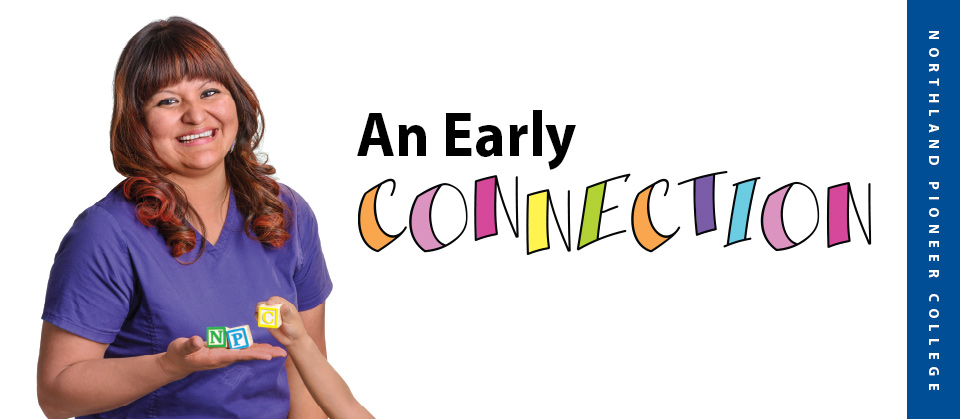 Love working with small children? Few educational fields are more important than those centered on the development and care of infants and young children.
Love working with small children? Few educational fields are more important than those centered on the development and care of infants and young children.
Visible and invisible energy flows through the children in the White Mountain Apache Head Start in Whiteriver as their young minds form nearly 700 new neural connections every second! It’s happening as they build towers with blocks, create a colorful drawing, cook a meal in the miniature kitchen, or sit quietly and listen to a story read by their teacher, Heather Pahe, a graduate of Northland Pioneer College’s Early Childhood Development (ECD) program.
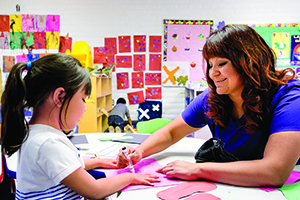
White Mountain Apache Head Start teacher Heather Pahe helps a young girl trace her hand for an art project.
To someone unfamiliar with working with small children, the room’s activities appear to be just play. But early child educators consider play an essential component in a child’s emotional, social, physical and intellectual development. Research at the Center on the Developing Child at Harvard University and other institutions shows that the development process begins before birth and continues into adulthood. When parents don’t interact enough with a child, the child’s brain may not develop normally, leading to learning and behavior difficulties.
That’s why this field is so important. Early childhood education is all about preparing children for a life of learning, helping them sharpen their thinking and attention skills, strengthening their interactions with peers and encouraging more exploratory behavior. It’s exciting to know that time spent with a small child can alter their futures.
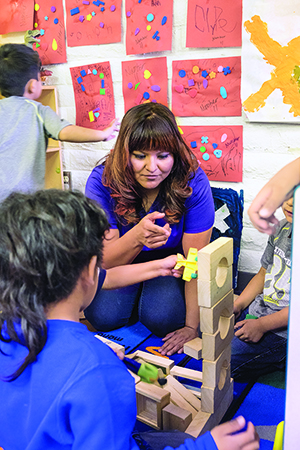 “To see a child smile makes this job worth it,” says Pahe, who has been working at WMAT Head Start for 10 years. “You’re making a difference in a child’s life. They look up to you and always remember the impact you had on their lives.” She recounts how an eighth grader recently came up to her, gave her a big hug, and thanked her for being his preschool teacher. “Helping a child who is struggling with something, their colors or letters, who suddenly ‘gets it’ is amazing.”
“To see a child smile makes this job worth it,” says Pahe, who has been working at WMAT Head Start for 10 years. “You’re making a difference in a child’s life. They look up to you and always remember the impact you had on their lives.” She recounts how an eighth grader recently came up to her, gave her a big hug, and thanked her for being his preschool teacher. “Helping a child who is struggling with something, their colors or letters, who suddenly ‘gets it’ is amazing.”
Pahe grew up in Seven Mile, where she attended private high school, playing forward on the basketball team before enrolling briefly at Central Arizona College. She credits her single-parent dad with encouraging her to complete her education and her four children – all under the age of 8 – with motivating her to keep going to school.
When Pahe came into the NPC Whiteriver Center and expressed an interest in working with children, Laurel Endfield, who was the center’s manager at the time, recommended that she enroll in an early childhood course taught by Laurel’s mother, Claude, to explore ECD as a career path. “Claude made it fun, and I was hooked. She’s the reason I’m in ECD,” said Pahe.
“Heather was an outstanding student in my Introduction to Early Childhood Education course, so I encouraged her to apply at Head Start,” said Claude Endfield, NPC’s ECD program chair. Together, the Endfields continued to encourage Pahe to pursue her career in early childhood education. Pahe is now head teacher in her own classroom at the Alchesay Beginnings Child Development Center in Whiteriver.
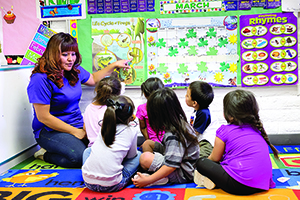 Pahe completed her NPC Associate of Applied Science (AAS) degree in ECD with a Preschool specialization in December 2009, and in December 2015, she received her bachelor’s degree in Early Childhood Education from Prescott College. She is now enrolled in Prescott’s master’s degree program. She also has a nationally-certified Child Development Associate (CDA) Credential,™ a key stepping stone on the path of career advancement in early childhood education.
Pahe completed her NPC Associate of Applied Science (AAS) degree in ECD with a Preschool specialization in December 2009, and in December 2015, she received her bachelor’s degree in Early Childhood Education from Prescott College. She is now enrolled in Prescott’s master’s degree program. She also has a nationally-certified Child Development Associate (CDA) Credential,™ a key stepping stone on the path of career advancement in early childhood education.
What advice would Pahe give to those interested in an Early Childhood career? Pahe strongly encourages others who are interested in working with small child-ren to explore the ECD program at NPC. “Be strong and independent and keep taking modules until you finish your degree.” Pahe, who has run half-marathons and is preparing for a full one says, “Never give up. The road may be bumpy – mine was – but if you believe in what you are accomplishing, you will succeed.”
Is Early Childhood Development right for you?
Do you have an enthusiasm for children that goes beyond enjoying being with them to wanting to make a difference in their lives? ECD caregivers are passionate about unlocking every child’s path to learning and over-coming any obstacles. They also have huge amounts of patience and a good sense of humor.
If this sounds like you, then ECD may be just the right career path. Taking ECD classes at NPC can help you determine the area of specialization in which you are interested.
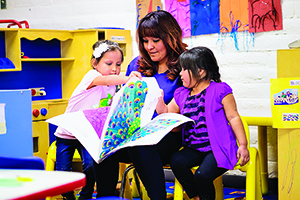 Claude Endfield, NPC’s ECD program chair, suggests starting with Introduction to Early Childhood Education (ECD 200), which provides a great overview and doesn’t require the student to be a “volunteer” or already employed in an Early Childhood setting. It’s the perfect class to give you enough information about ECD to help you decide which NPC option will work best for you.
Claude Endfield, NPC’s ECD program chair, suggests starting with Introduction to Early Childhood Education (ECD 200), which provides a great overview and doesn’t require the student to be a “volunteer” or already employed in an Early Childhood setting. It’s the perfect class to give you enough information about ECD to help you decide which NPC option will work best for you.
Students interested in ECD can earn an NPC Associ-ate of Arts in Early Childhood (AAEC) degree that will transfer to all three state public universities, Prescott College and Diné College.
NPC also offers a direct-to-work Associate of Applied Science (AAS) degree in Early Childhood Development in one of five specializations: Early Childhood Management (primarily for preschool and daycare center directors), Family Care (for in-home caregivers), Infant/Toddler (for birth through age 3 caregivers), Preschool (introducing math, science, music and language) or School Age (encouraging spontaneous expression and expanding imaginations), as well as certificates of applied science and proficiency in the areas of specialization. (There is no CP in management.) Three of the five specializations prepare students for the CDA Credential™ assessment, which focuses on birth through age 5. Eligibility for federal Pell grant funding varies by program, so check with an academic adviser or NPC’s financial aid office.
Once a student completes the introduction courses he or she can continue to take individual courses as “modules,” focusing on age-appropriate learning. Many modules are completed at the student’s home or care center, with an adjunct or full-time NPC faculty member visiting and observing the ECD student’s progress and interaction with children.
Arizona now requires all K-3 teachers to have birth- to-age-8 educator or caregiver experience. The national CDA Credential™ provides proof of that experience.
If you are a non-degree-seeking student who works in a less formal setting with children, such as pediatric medical or dental facilities or churches, you should consider taking introductory ECD courses, such as Ensuring Healthy Environments (ECD 100) and Safe Environments (ECD 102) to help you further your career.
NPC also partners with several Arizona First Things First (FTF) local councils to provide continuing education opportunities for those already involved in Early Childhood. A recent professional development grant through the Navajo Nation FTF Council will focus on providing a series of classes about “Social Emotional Development in Young Children,” required training for those already employed in ECD positions. NPC will provide instruction at each of the three Navajo Agencies over the next two years, depending on continued grant funding.
To find out more about the many ECD options, speak to an NPC academic adviser or visit our website.
www.npc.edu/early-childhood-studies
– Everett Robinson
National Attention
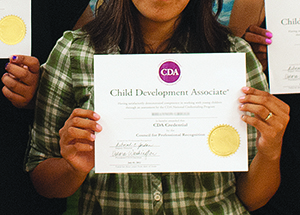 Alchesay High School in Whiteriver is building a national reputation for training Early Childhood professionals who graduate with their national CDA Credential,™ their high school diploma and at least one Certificate of Proficiency (CP) in any of five areas of ECD specialization from Northland Pioneer College.
Alchesay High School in Whiteriver is building a national reputation for training Early Childhood professionals who graduate with their national CDA Credential,™ their high school diploma and at least one Certificate of Proficiency (CP) in any of five areas of ECD specialization from Northland Pioneer College.
Alchesay students were the first high schoolers in Arizona, and only the second group in the nation, to earn their CDAs while still in high school! Utilizing NPC’s dual enrollment program, students earn both college and high school credits for participating in the early childhood program. Many graduate from high school needing only to complete the general education courses required to earn an Associate of Applied Science degree in ECD.
The Washington, D.C.-based National Council for Professional Recognition developed the Child Development Associate (CDA) Credential™ to measure the competency of early care professionals and recognize that knowledge with a nationally-transferable credential. CDAs understand how to put the CDA Competency Standards into practice to nurture children’s emotional, physical, intellectual, and social development. The CDA Credential™ is required for all Head Start workers. Many private childcare providers offer higher pay for workers with a CDA.
“It’s a rigorous program,” says Laurel Endfield, coordinator and director of the Childhood Development program at Alchesay. “It requires dedication to complete 480 hours working with young children and assemble the documentation showing each student as a lead teacher in a center-based or family child care program. It is very impressive that these students are committing to an intensive program like the CDA while still in high school.”
Endfield sees nothing but positive outcomes in the future. “This program is raising the quality and professionalism of the whole community. It’s even helping the whole field of childhood development. These students are employable not just in our communities but nationwide. We can see significant benefits for the children they teach.”
www.npc.edu/college-credit-high-school
Leaving a Legacy
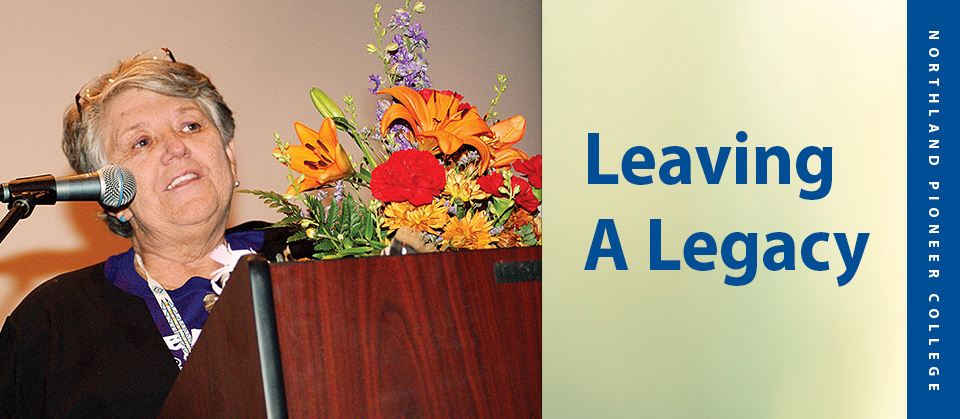 Northland’s ECD program traces its roots back to the college’s founding in 1974, when Claude Endfield was one of the college’s first 10 graduates. She has helped guide the ECD program since 1988, adding age-specific specializations and adjusting curricula to meet our communities’ changing needs.
Northland’s ECD program traces its roots back to the college’s founding in 1974, when Claude Endfield was one of the college’s first 10 graduates. She has helped guide the ECD program since 1988, adding age-specific specializations and adjusting curricula to meet our communities’ changing needs.
Retiring in June 2016, Endfield has easily traveled over a million miles, on paved roads and wagon tracks to bring ECD instruction to residents of the Navajo, Hopi and White Mountain Apache reservations and adjoining communities.
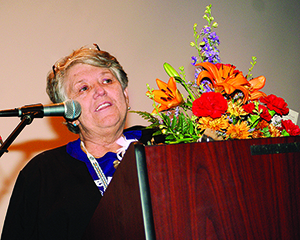
Claude Endfield, retiring chair of NPC’s Early Childhood Education program, received a bouquet of flowers and a Peterson Yazzie Kachina during the Early Childhood Fair on October 28, 2015. An endowed scholarship in her honor was announced to help support ECD students.
Endfield has served as a consultant/evaluator for the Child Care Bureau and national Head Start to tribal ECD programs in rural Alaska, Oklahoma, Texas and New Mexico. She is so well respected and admired that an endowed scholarship for NPC early childhood students has been created in her honor (npcfriendsfamily.org).
Endfield is a big proponent of encouraging students to earn their CDA Credential, awarded by The Council for Early Childhood Recognition which certifies a core set of competency standards for the provider/educator. “Initially, only Head Start workers were interested in earning their CDA Credential, but now child care providers, in both center and home settings, are also interested,” notes Endfield.
National Head Start standards require that half of the staff members at a given Head Start location have associate degrees, with the remainder having bachelor’s or higher degrees in early childhood or a related field. (Education isn’t considered a related field.) Endfield estimates that 100 percent of Head Start teachers in NPC’s service area prepared for their CDA Credential through NPC, with many continuing on to complete NPC certificates and degrees.
“We train Early Childhood professionals, whether they are called family providers, child care providers, early educators, or child care aides. NPC offers a wide variety of degrees and certificates to meet many different needs. Our program focuses on teaching students to be the best early childhood educators and helps them find their place in a very enjoyable, rewarding career. It has been a pleasure and honor to teach and work with them throughout the years,” said Endfield.
